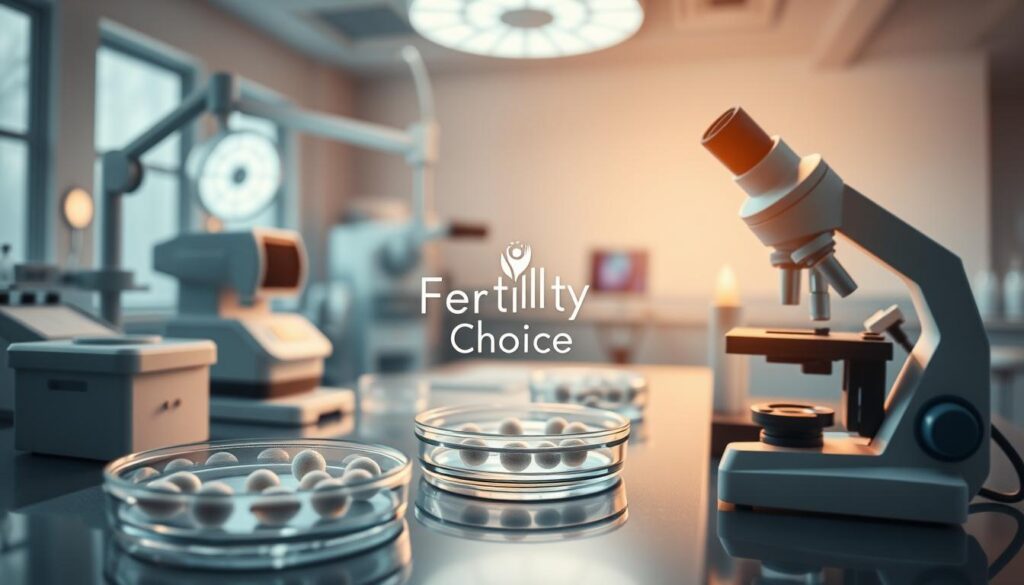
The ivf procedure, also known as in vitro fertilisation, is a fertility treatment that spans around 28 days1. It involves several steps and procedures. These include ovulation stimulation, egg retrieval, fertilisation, and embryo transfer.
As a South African patient, it’s key to know about the ivf procedure. You should understand what to expect from the start to the end. The embryo transfer usually takes about 10 minutes. There’s also 30 minutes for recovery2. On average, an ivf treatment cycle lasts about 28 days1.
The ivf process has many steps. Thanks to fertility clinics and advanced technology, many couples have successfully conceived through ivf. This is a big part of fertility treatment. Patients are told to avoid intercourse for two days before follicle aspiration and for another 10 days after2.
The fertility procedure known as IVF, or in vitro fertilisation, is a way to help people have a baby. It involves fertilising an egg with sperm outside the body3. Many couples choose IVF because of issues like blocked fallopian tubes or low sperm count.
Women under 37 should have just one embryo transferred in their first IVF cycle3. The whole IVF journey can take months. Some people may need more than one round to get pregnant4.
The steps in IVF include stimulating the ovaries, retrieving eggs, and transferring embryos. This can be tough emotionally for many5.
Here are some key points to consider when undergoing IVF:
The ivf process is complex and can be emotionally tough. But, with the right support, many couples achieve their dream of having a child through assisted reproduction4. It’s crucial to understand the fertility procedure and the ivf process to make informed choices about treatment5.
| Age Group | Embryo Transfer |
|---|---|
| Under 37 years | Single embryo transfer in 1st cycle3 |
| 37-39 years | Single embryo transfer in 1st and 2nd cycles if top-quality embryos are available3 |
The IVF process is a detailed series of steps. It needs careful planning and execution by a skilled fertility clinic. It starts with an initial consultation, where a couple talks to a fertility specialist. They discuss their options and decide on the best fertility treatment6.
Next, ovarian stimulation happens. The woman is given medication to make her ovaries produce many eggs. This is a key part of fertility services7.
After that, egg retrieval takes place, usually under sedation. This is to collect the eggs from the ovaries7. The eggs are then fertilised with sperm. The resulting embryos are grown in a lab for a few days before being put into the woman’s uterus6.
This journey can be emotionally tough. But, with the right support and care from a trusted ivf clinic, couples can boost their chances of success8.
It’s important to know about the risks of IVF, like the chance of having multiple babies. This can lead to more complications during pregnancy and childbirth6. Also, IVF can be expensive, with medication costs between $12,000 and $17,000 per cycle8. Yet, with the right fertility services and support, many couples can start their family.
When you’re getting ready for an ivf procedure, knowing the tests and checks needed is key. About 1 in 8 women need IVF to conceive9. The prep time for IVF usually takes 2 to 4 weeks9.
Making lifestyle changes can help. Eating well, stopping smoking, and managing stress can boost your chances of success in assisted reproduction. Eating a Mediterranean diet can also help women under 35 without obesity9. Getting 7 to 8 hours of sleep a night can also increase your chances of getting pregnant9.
It’s also important to have emotional support and counselling. The whole IVF cycle can take about 4 to 6 weeks from starting the drugs to the embryo transfer10. Choosing a supportive clinic is crucial for guidance during the ivf procedure.
| Stage | Duration | Description |
|---|---|---|
| Stage 1 | 1 day | First day of the menstrual cycle |
| Stage 2 | 3-12 days | Fertility drugs are administered to stimulate the ovaries |
| Stage 3 | 1 day | hCG injection and egg harvesting |
By knowing the tests, lifestyle changes, and emotional support needed before IVF, couples can prepare better. This can help increase their chances of success in assisted reproduction11.
There are many fertility services available at an ivf clinic. Each has its own benefits and drawbacks. The right choice depends on your situation and the fertility treatment you need12.
Some well-known IVF methods include standard IVF, ICSI, and preimplantation genetic testing13. Standard IVF mixes an egg with sperm in a lab. ICSI, on the other hand, injects a single sperm into an egg12. Preimplantation genetic testing checks embryos for genetic issues before they’re put in the uterus13.
Statistics show that about 5% of couples trying to conceive have turned to IVF. Since 1978, over 8 million babies have been born thanks to IVF worldwide14. The success rate of IVF also depends on the mother’s age. Women under 35 have a 46.7% success rate14.
| IVF Technique | Description |
|---|---|
| Standard IVF | Fertilising an egg with sperm in a laboratory |
| ICSI | Injecting a single sperm into an egg |
| Preimplantation Genetic Testing | Testing embryos for genetic disorders before transfer |

When picking an ivf clinic, look at several important things. Couples should check the clinic’s success rates, experience, and how well it’s known15. Look closely at the clinic’s success rates, focusing on age, total cycles, and success percentages from SART15.
A clinic that shares its success rates with SART shows it’s open and follows high standards since 198515. It’s also key to pick a clinic with doctors who are experts in reproductive health and have lots of training15. The clinic should do detailed fertility testing, like checking the uterus, fallopian tubes, ovaries, and hormone levels15.
Some important things to think about when picking an ivf clinic include:
By looking at these points and researching clinics, couples can make a smart choice. This can help their chances of a successful ivf treatment16. It’s also important to check a clinic’s embryo management and how well embryos survive after thawing16. Clinics that focus on special fertility needs can offer better care, making treatment more effective16.
Choosing the right ivf clinic is a big decision that can really affect treatment success17. By looking at the factors mentioned and researching clinics, couples can find a good and effective fertility clinic that fits their needs17.
| Clinic | Success Rates | Experience |
|---|---|---|
| Baylor College of Medicine | High success rates | Established in 1983 |
The cost of IVF in South Africa can be quite high, ranging from R85,000 to R100,000 per cycle18. This includes the cost of medication, lab fees, and clinic charges. It’s important to remember that it often takes more than one cycle to succeed, which raises the total cost18.
Understanding the costs of IVF is key. A cycle of IVF with ICSI costs around R65,000 – R75,00019. Also, IUI costs can be between R 4000-6000 per cycle20.
Insurance might help with some fertility treatment costs. But, it’s important to check with your insurance provider first. Medical aid plans must cover the cost of diagnosing infertility. Yet, they don’t cover treatment costs after diagnosis18. Some medical aids, like Discovery Health’s top plans, do cover IVF and other assisted reproductive therapies19.
There are financing options like payment plans and loans to help with IVF costs. It’s crucial to look into and compare what different fertility clinics offer. This way, you can find the best fit for your budget and needs.
When you’re going through an ivf process, knowing the possible risks and side effects is key. These can include mood swings, bloating, and feeling very tired21. There’s also a small chance of rare problems during egg retrieval and embryo transfer21.
Hormonal fertility medications can cause side effects like soreness, bruising, and nausea21. Some women might also feel breast tenderness or have allergic reactions21. A rare issue called OHSS can happen, causing bloating, nausea, and weight gain21.
There’s a higher chance of having twins or more with ivf process22. This can lead to issues like preterm labor and gestational diabetes22.
Feeling stressed is common after ivf process failures21. This stress can affect your mental health, making it hard to cope with pregnancy loss21. It’s vital to talk about these risks with a fertility specialist before starting23.
To lower the risks of ivf process, follow your fertility specialist‘s advice22. Make sure to go to all your appointments22. Knowing the risks helps you make better choices and work towards a successful fertility procedure23.
When looking into IVF treatment, the success rate of the fertility clinic or ivf clinic is key. In South Africa, success rates differ based on age and egg quality24. About 9 million IVF babies have been born globally since 197824. Cape Fertility has an average success rate of 45%24.
The success rate for IVF and ICSI with donor eggs from Cape Fertility’s Egg Donor Program is 65%24.
Age is a big factor in IVF success. Women under 35 have a higher success rate than those over 4024. For women over 40, using donor eggs can increase success to 25%, up from 10% with their own eggs24. It’s vital to talk about these factors with a fertility specialist when choosing a fertility clinic or ivf clinic for fertility services.

Some top ivf clinic choices in South Africa include Wijnland Fertility Clinic and Joburg Fertility Clinic. Wijnland reports a success rate of 63% to 68% for those under 3525. Joburg Fertility Clinic has a success rate of 65%25. These figures highlight the need to pick the right fertility clinic for your fertility services needs.
When thinking about fertility treatment, it’s key to know the legal and ethical sides of assisted reproduction and the ivf procedure. In South Africa, the Department of Health oversees IVF, making rules for it26. It’s important to think about donor anonymity and consent. Couples can choose between anonymous or known donors.
Important ethical points include the use of surrogates and egg donors. Studies show that children born to mothers over 35 don’t have more health issues26. Yet, infertility is common in Africa, with 16.4% of people facing it at some point27.
Also, not many African countries offer IVF, with only 21 out of 54 doing so27. The high cost and limited access to IVF hurt those who can’t afford it. As more people want assisted reproduction and ivf procedure, we must tackle these issues. This way, everyone can get the fertility care they need.
In summary, the legal and ethical sides of fertility treatment, assisted reproduction, and the ivf procedure are complex. As we move ahead, we must focus on individual needs, children’s rights, and health risks. This ensures everyone gets the care they deserve2627.
After IVF, getting the right care is key for a healthy pregnancy. This means regular blood tests and ultrasound scans28. It’s also important to have a support system ready for any tough times.
For those needing more IVF cycles, having a plan is vital. You might need to change your medication or try new techniques like preimplantation genetic testing28. An ivf clinic can help guide you through these choices.
Some important things to think about after IVF include:
With the right care and a solid plan, couples can boost their chances of a successful pregnancy. This makes the journey with fertility services and ivf clinics better29.
For those going through an ivf procedure, having a community to lean on is key. The emotional path of fertility treatment can be tough. But, with a support system, the journey can feel less lonely.
There are many groups and resources out there for those facing ivf and other fertility treatments. Some groups offer financial help, like the Hope for Fertility Foundation. They give grants from $250 to $5,000 to help people get fertility treatments30.
Online forums, like the IVF Support Group on Facebook with nearly 27,000 members, are also great. They let people share their stories and find others who understand their struggles31.
These resources offer both information and emotional support. They help people deal with the challenges of fertility treatments. By using these groups and resources, individuals can feel more supported and informed on their ivf journey32.
| Organization | Description |
|---|---|
| Hope for Fertility Foundation | Awards financial grants to assist individuals in accessing fertility treatments |
| IVF Support Group on Facebook | An online forum with nearly 27,000 members, providing a platform for individuals to share their experiences and connect with others |
As you finish this guide on IVF in South Africa, we hope you’re ready to move forward in your fertility journey33. The success rate for IVF here is about 30% to 35% per cycle. This depends on your age and health33. Around 1 in 6 couples in South Africa face infertility, showing the need for IVF solutions.
Every person’s journey to becoming a parent is different. IVF can be tough emotionally and financially33. Women under 35 have a 40% success rate, but this drops to 5% to 15% for those over 4033. Eating well and exercising can help, possibly increasing success by up to 20%.
Now, it’s time to contact trusted IVF clinics and fertility services in South Africa. Get support from doctors, family, and support groups33. A single IVF cycle costs between R30,000 to R50,000, which can be a big challenge for many33. About 30% of patients use financing plans because of these costs.
You’re not alone in this journey. Staying positive and focused on starting a family can boost your chances33. Emotional support is key; counseling or support groups can make your journey better and help you cope33. You’ll usually wait about 14 days for IVF results, a time to manage your emotions well.
We wish you the best as you start this important journey. For more help and advice, please contact the International Pride IVF Centre34. Our team is here to support you every step of the way.
Stay Connected and Get Personalized Assistance
Thank you for reading! We hope you found this post helpful and informative. If you have any questions or need further assistance, please reach out. We’re here to help you on your journey
